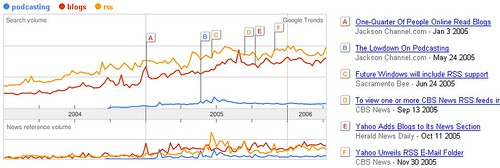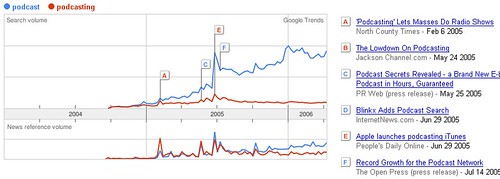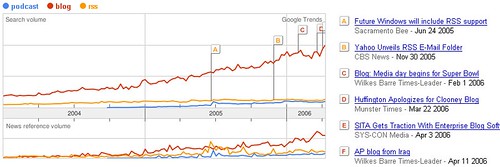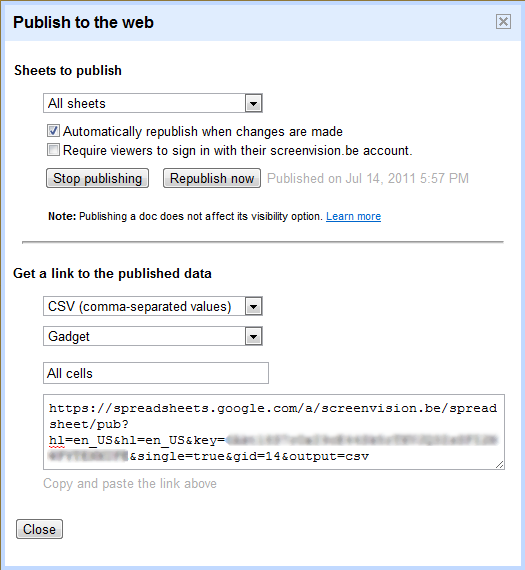Lies, damned lies and Google trends
16 May 2006Yesterday I was browsing through my freshly arrived Tufte book “The visual display of quantitative information“. One example of “garbage in, garbage out” that he gives is the London Stock Exchange index (which went way down one year in Dec) and the solar radiation in that same year (which obviously also went down in the winter). Plotting both lines in the same graph gives the impression of correlation (Stock Exchange went down because of lack of sun).
Now take a look at this chart:

This seems to imply that, since the term “RSS” is more searched for than “blogs”, that RSS is more popular than this whole “blogs” thing, right?
And this is exactly what was written in businessweek.com. It was cited by socialsoftware.weblogsinc.com, who -to their credit- added the wise remark that:
To be honest, I do think that RSS is as important as I said above, but in terms of use frequency it’s also got the semantic advantage of only having one tense. People will write about and search for blogs, blog and blogging for example – but RSS is a one-term wonder.
Dave again
The whole thing was started by Dave Winer:
Interesting comparison between blogs and podcasting. RSS is bigger than both.
(But then podcast vs blogs shows something different.)
scripting.com via businessweek.com
Dave is of course a clever man, so I don’t think he was trying to show that RSS is more important than blogs, rather that with a careful choice of keywords, one can ‘prove’ whatever one likes. He chose the keywords: “podcasting”, “blogs” and “rss”.
Podcasting

“Podcasting” does not rank very high in search traffic, but “podcast” does much better as a keyword. Of course, people are lazy. If Dave and Adam had chosen another name for podcasting with a more unique first part, say “ppoodd-casting’, the biggest search term would be ‘ppoodd’, not ‘ppooddcast’.
Blogs
<img src=”http://static.flickr.com/44/147471376_b4a3001fcc.jpg” width=”500” height=”191” alt=”Google Trends: “blog” vs “blogs”” />
Same remark: ‘blog’ is the shortest significant keyword, so the most popular. Not ‘blogs’, ‘blogging’, ‘weblog’, …
RSS
<img src=”http://static.flickr.com/53/147471379_e9facabf26.jpg” width=”500” height=”168” alt=”Google Trends: “RSS” vs “XML”” />
In fact, this graph has no meaning. It looks like it plots the popularity of RSS and Atom web feeds against that of ‘XML’, but the data is contaminated. RSS is also “Rashtriya Swayamsevak Sangh” (a nationalist social service organization in India – described by The Economist as the largest non-communist organisation in the world), and the UK Royal Statistical Society, who would probably agree with the danger of misusing statistics.
‘Atom’ might also be a syndication format, it will always primarily be the ‘smallest possible particle of a chemical element that retains its chemical properties’.
Better chart
So this would be, in my opinion, a better chart:

The popularities of ‘RSS’ and ‘podcast’ are in the same order of magnitude, but ‘blog’ is clearly a much more important keyword.
Google Trends worthless?
Is Google Trends worthless then? I don’t think so, I just think it is a tool to be used by someone with some experience in data analysis, statistics, language and most of all: some critical sense. And preferably for questions of life and death, like: who’s more popular, Angelina Jolie or Britney Spears?

